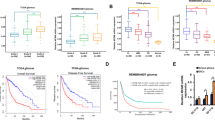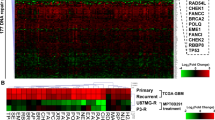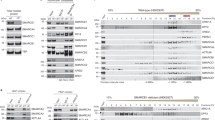Abstract
Minichromosome maintenance (MCM) proteins are key elements that function as a part of the pre-replication complex to initiate DNA replication in eukaryotes. Consistent with their roles in initiating DNA replication, overexpression of MCM family members has been observed in several malignancies. Through bioinformatic analysis of The Cancer Genome Atlas’s data on glioblastoma multiforme (GBM), we found that the genomic region containing MCM7 gene was amplified in more than 80% of the present cases. To validate this finding and to identify the possible contribution of the remaining members of the MCM family to GBM progression, we used quantitative real-time PCR to analyze the gene expression profiles of all MCM family members in Grade IV (GBM) tissue samples and observed a significant upregulation in GBM samples compared with normal white matter tissues. In addition, we compared the observed gene expression profiles with those of Grade II and Grade III astrocytoma samples and determined that the observed upregulation was restricted and specific to Grade IV. MCM7 was the most upregulated gene in the gene set we analyzed, and therefore we wanted to identify the role of MCM7 in GBM progression. We determined that siRNA-mediated knockdown of MCM7 expression reduced GBM cell proliferation and also inhibited tumor growth in both xenograft and orthotopic mouse models of GBM. Taken together, our data suggest that MCM7 can be a potential prognostic marker and a novel therapeutic target in GBM therapy.
This is a preview of subscription content, access via your institution
Access options
Subscribe to this journal
Receive 50 print issues and online access
$259.00 per year
only $5.18 per issue
Buy this article
- Purchase on Springer Link
- Instant access to full article PDF
Prices may be subject to local taxes which are calculated during checkout







Similar content being viewed by others
References
Bell SP, Stillman B . ATP-dependent recognition of eukaryotic origins of DNA replication by a multiprotein complex. Nature 1992; 357: 128–134.
Donovan S, Harwood J, Drury LS, Diffley JF . Cdc6p-dependent loading of Mcm proteins onto pre-replicative chromatin in budding yeast. Proc Natl Acad Sci USA 1997; 94: 5611–5616.
Randell JC, Bowers JL, Rodriguez HK, Bell SP . Sequential ATP hydrolysis by Cdc6 and ORC directs loading of the Mcm2-7 helicase. Mol Cell 2006; 21: 29–39.
Maine GT, Sinha P, Tye BK . Mutants of S. cerevisiae defective in the maintenance of minichromosomes. Genetics 1984; 106: 365–385.
Gozuacik D, Chami M, Lagorce D, Faivre J, Murakami Y, Poch O et al. Identification and functional characterization of a new member of the human Mcm protein family: hMcm8. Nucleic Acids Res 2003; 31: 570–579.
Maiorano D, Cuvier O, Danis E, Mechali M . MCM8 is an MCM2-7-related protein that functions as a DNA helicase during replication elongation and not initiation. Cell 2005; 120: 315–328.
Lutzmann M, Maiorano D, Mechali M . Identification of full genes and proteins of MCM9, a novel, vertebrate-specific member of the MCM2-8 protein family. Gene 2005; 362: 51–56.
Yoshida K . Identification of a novel cell-cycle-induced MCM family protein MCM9. Biochem Biophys Res Commun 2005; 331: 669–674.
Forsburg SL . Eukaryotic MCM proteins: beyond replication initiation. Microbiol Mol Bio Rev 2004; 68: 109–131.
Maiorano D, Lutzmann M, Mechali M . MCM proteins and DNA replication. Curr Opin Cell Biol 2006; 18: 130–136.
Saydam O, Senol O, Schaaij-Visser TB, Pham TV, Piersma SR, Stemmer-Rachamimov AO et al. Comparative protein profiling reveals minichromosome maintenance (MCM) proteins as novel potential tumor markers for meningiomas. J Proteome Res 2010; 9: 485–494.
Lau KM, Chan QK, Pang JC, Li KK, Yeung WW, Chung NY et al. Minichromosome maintenance proteins 2, 3 and 7 in medulloblastoma: overexpression and involvement in regulation of cell migration and invasion. Oncogene 2010; 29: 5475–5489.
Gruber-Olipitz M, Yang JW, Stroebel T, Slavc I, Lubec G . The medulloblastoma cell line DAOY but not eleven other tumor cell lines expresses minichromosome maintenance protein 4. Cancer lett 2006; 238: 76–84.
Toyokawa G, Masuda K, Daigo Y, Cho HS, Yoshimatsu M, Takawa M et al. Minichromosome Maintenance Protein 7 is a potential therapeutic target in human cancer and a novel prognostic marker of non-small cell lung cancer. Mol Cancer 2011; 10: 65.
Kikuchi J, Kinoshita I, Shimizu Y, Kikuchi E, Takeda K, Aburatani H et al. Minichromosome maintenance (MCM) protein 4 as a marker for proliferation and its clinical and clinicopathological significance in non-small cell lung cancer. Lung Cancer 2011; 72: 229–237.
Yang J, Ramnath N, Moysich KB, Asch HL, Swede H, Alrawi SJ et al. Prognostic significance of MCM2 Ki-67 and gelsolin in non-small cell lung cancer. BMC cancer 2006; 6: 203.
Ramnath N, Hernandez FJ, Tan DF, Huberman JA, Natarajan N, Beck AF et al. MCM2 is an independent predictor of survival in patients with non-small-cell lung cancer. J Clin Oncol 2001; 19: 4259–4266.
Nishihara K, Shomori K, Fujioka S, Tokuyasu N, Inaba A, Osaki M et al. Minichromosome maintenance protein 7 in colorectal cancer: implication of prognostic significance. Int J Oncol 2008; 33: 245–251.
Giaginis C, Giagini A, Tsourouflis G, Gatzidou E, Agapitos E, Kouraklis G et al. MCM-2 and MCM-5 expression in gastric adenocarcinoma: clinical significance and comparison with Ki-67 proliferative marker. Dig Dis Sci 2011; 56: 777–785.
Tamura T, Shomori K, Haruki T, Nosaka K, Hamamoto Y, Shiomi T et al. Minichromosome maintenance-7 and geminin are reliable prognostic markers in patients with oral squamous cell carcinoma: immunohistochemical study. J Oral Pathol Med 2010; 39: 328–334.
Guida T, Salvatore G, Faviana P, Giannini R, Garcia-Rostan G, Provitera L et al. Mitogenic effects of the up-regulation of minichromosome maintenance proteins in anaplastic thyroid carcinoma. J Clin Endocrinol Metab 2005; 90: 4703–4709.
Giaginis C, Vgenopoulou S, Vielh P, Theocharis S . MCM proteins as diagnostic and prognostic tumor markers in the clinical setting. Histol Histopathol 2010; 25: 351–370.
Louis DN, Ohgaki H, Wiestler OD, Cavenee WK . WHO Classification of Tumours of the Central Nervous System Fourth edn IARC, 2007. 312 p).
Verhaak RG, Hoadley KA, Purdom E, Wang V, Qi Y, Wilkerson MD et al. Integrated genomic analysis identifies clinically relevant subtypes of glioblastoma characterized by abnormalities in PDGFRA, IDH1, EGFR, and NF1. Cancer Cell 2010; 17: 98–110.
Research TCGA, Comprehensive genomic characterization defines human glioblastoma genes and core pathways. Nature 2008; 455: 1061–1068.
Facoetti A, Ranza E, Benericetti E, Ceroni M, Tedeschi F, Nano R . Minichromosome maintenance protein 7: a reliable tool for glioblastoma proliferation index. Anticancer Res 2006; 26: 1071–1075.
Facoetti A, Ranza E, Grecchi I, Benericetti E, Ceroni M, Morbini P et al. Immunohistochemical evaluation of minichromosome maintenance protein 7 in astrocytoma grading. Anticancer Res 2006; 26: 3513–3516.
Ibarra A, Schwob E, Mendez J . Excess MCM proteins protect human cells from replicative stress by licensing backup origins of replication. Proc Natl Acad Sci USA 2008; 105: 8956–8961.
Gambus A, Jones RC, Sanchez-Diaz A, Kanemaki M, van Deursen F, Edmondson RD et al. GINS maintains association of Cdc45 with MCM in replisome progression complexes at eukaryotic DNA replication forks. Nat Cell Biol 2006; 8: 358–366.
Bruck I, Kaplan D . Dbf4-Cdc7 phosphorylation of Mcm2 is required for cell growth. J Biol Chem 2009; 284: 28823–28831.
Montagnoli A, Valsasina B, Brotherton D, Troiani S, Rainoldi S, Tenca P et al. Identification of Mcm2 phosphorylation sites by S-phase-regulating kinases. J Biol Chem 2006; 281: 10281–10290.
Chuang LC, Teixeira LK, Wohlschlegel JA, Henze M, Yates JR, Mendez J et al. Phosphorylation of Mcm2 by Cdc7 promotes pre-replication complex assembly during cell-cycle re-entry. Mol Cell 2009; 35: 206–216.
Tsuji T, Ficarro SB, Jiang W . Essential role of phosphorylation of MCM2 by Cdc7/Dbf4 in the initiation of DNA replication in mammalian cells. Mol Biol Cell 2006; 17: 4459–4472.
Cho WH, Lee YJ, Kong SI, Hurwitz J, Lee JK . CDC7 kinase phosphorylates serine residues adjacent to acidic amino acids in the minichromosome maintenance 2 protein. Proc Natl Acad Sci USA 2006; 103: 11521–11526.
Montagnoli A, Moll J, Colotta F . Targeting cell division cycle 7 kinase: a new approach for cancer therapy. Clin Cancer Res 2010; 16: 4503–4508.
Saydam O, Senol O, Wurdinger T, Mizrak A, Ozdener GB, Stemmer-Rachamimov AO et al. miRNA-7 attenuation in Schwannoma tumors stimulates growth by upregulating three oncogenic signaling pathways. Cancer Res 2011; 71: 852–861.
Saydam O, Shen Y, Wurdinger T, Senol O, Boke E, James MF et al. Downregulated microRNA-200a in meningiomas promotes tumor growth by reducing E-cadherin and activating the Wnt/beta-catenin signaling pathway. Mol Cell Biol 2009; 29: 5923–5940.
Saydam O, Glauser DL, Heid I, Turkeri G, Hilbe M, Jacobs AH et al. Herpes simplex virus 1 amplicon vector-mediated siRNA targeting epidermal growth factor receptor inhibits growth of human glioma cells in vivo. Mole Ther: 2005; 12: 803–812.
Wurdinger T, Badr C, Pike L, de Kleine R, Weissleder R, Breakefield XO et al. A secreted luciferase for ex vivo monitoring of in vivo processes. Nat Methods 2008; 5: 171–173.
Acknowledgements
This work was supported , in part, by Forschungsgesellschaft for Brain Tumors (OS, NS), EU-FP7-PEOPLE-2011-CIG (OS) and Association for Conduct of Scientific Research in the Field of Neonatology and Pediatric Intensive Care: ‘Unser Kind’ (OS and NS).
Author information
Authors and Affiliations
Corresponding author
Ethics declarations
Competing interests
The authors declare no conflict of interest.
Additional information
Supplementary Information accompanies this paper on the Oncogene website
Supplementary information
Rights and permissions
About this article
Cite this article
Erkan, E., Ströbel, T., Lewandrowski, G. et al. Depletion of minichromosome maintenance protein 7 inhibits glioblastoma multiforme tumor growth in vivo. Oncogene 33, 4778–4785 (2014). https://doi.org/10.1038/onc.2013.423
Received:
Revised:
Accepted:
Published:
Issue Date:
DOI: https://doi.org/10.1038/onc.2013.423
Keywords
This article is cited by
-
Development and validation of a glioma-associated mesenchymal stem cell-related gene prognostic index for predicting prognosis and guiding individualized therapy in glioma
Stem Cell Research & Therapy (2023)
-
Transcriptional expression and prognostic roles of MCM7 in human bladder, breast, and lung cancers: a multi-omics analysis
Network Modeling Analysis in Health Informatics and Bioinformatics (2022)
-
MCM8 is regulated by EGFR signaling and promotes the growth of glioma stem cells through its interaction with DNA-replication-initiating factors
Oncogene (2021)
-
Knockdown of MCM10 Gene Impairs Glioblastoma Cell Proliferation, Migration and Invasion and the Implications for the Regulation of Tumorigenesis
Journal of Molecular Neuroscience (2020)
-
Arsenic trioxide inhibits liver cancer stem cells and metastasis by targeting SRF/MCM7 complex
Cell Death & Disease (2019)



